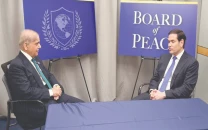The contest between secular and communal India
RSS trusts Modi to take hard right ideology forward to where a Hindu state at least does not appear as just a mirage.

The writer is a consulting editor with The Statesman and writes widely for several newspapers in India
The last few days have revealed a great deal really. One, the obvious, that all is not well in the BJP, with party stalwart Mr LK Advani leading a revolt of sorts to prevent himself from being marginalised. His decision to resign had the RSS and BJP leaders running to make peace and, in the process, Mr Advani endorsed Mr Modi’s elevation in the party but also ensured that he was kept in the loop. It is no secret that Mr Advani was not being consulted by the RSS on matters of top urgency and the details of the current pact suggest that he will not be so totally sidelined now.
Secondly, it is clear that the RSS now finds in Mr Modi all that it lost with the Babri Masjid and more. The demolition of the mosque had left the RSS and the BJP without an issue, and efforts to milk it over subsequent years had failed considerably as the mosque was no more. The disarray visible in the BJP over the last few years is a direct result of this absence of effective symbols and issues. Mr Modi symbolises all that the BJP had lost, in that he has the credentials that make him an effective symbol. He comes from a Hindutva background and demonstrated it in 2002, when hundreds of Muslims were killed under his watch in Gujarat; he gives the impression of being a ruthless administrator and a disciplinarian; and he has the personality and the support from the influential corporate and media sectors that place him ahead of all other competitors.
Third, his apparent popularity, at least in some sections of society, have encouraged the RSS to discard its no-one-individual rule to embrace the individual Mr Modi and allow him to breathe larger-than-life air into the balloon that is being created for national consumption.
Four, the RSS trusts Mr Modi to take the hard right ideology forward to a point where a Hindu state at least does not appear as just a mirage in the distance, and begins to acquire some contours of reality.
And five, in the RSS assessment, the BJP has a chance of winning the next elections only under Mr Modi, and no chance at all without him. The patience of yesteryear RSS leaders has been replaced by the impatient younger lot today, who have decided to ride roughshod over anyone (and this includes Mr Advani) who has reservations about Mr Modi and are determined to push the BJP to take a real shot at winning the elections. The general elections will thus be fought by the RSS as it strives to place its man in the seat of power.
The RSS sees in Mr Modi the magic bullet that it hopes to turn the tide with; but there is still little indication that he is regarded as such by the Indian masses living outside Delhi. Except for one regional party, namely the AIADMK, that has praised Mr Modi, the others are all keeping a distance, with some like the Biju Janata Dal and the JD(U) trying to place themselves in a pre-poll advantageous position to benefit from the counterreaction that is bound to follow Modi’s high-pitch campaign across the country.
The RSS is thus playing for high stakes in the hope it will win what is little more than a gamble at this stage. It has thrust a highly divisive individual to lead the BJP in the general elections, to test the waters as it were. It is using the gambit of development and growth and good administration to hide an essentially Hindutva agenda, with the drum beating by the media and big industry creating the necessary smokescreen. The contest thus is not between a Modi and a Rahul (Gandhi), or between an Advani and a Modi; it is between secular India and communal India with the vote in 2104 determining the direction of the nation’s polity.
Published in The Express Tribune, June 15th, 2013.
Like Opinion & Editorial on Facebook, follow @ETOpEd on Twitter to receive all updates on all our daily pieces.



















COMMENTS
Comments are moderated and generally will be posted if they are on-topic and not abusive.
For more information, please see our Comments FAQ